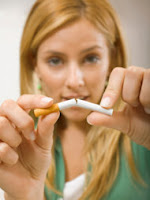Want to cut your risk of the big C by nearly a third? Make these nine lifestyle changes lifelong habits and you can do it. Because cancer takes years to develop, the earlier you start cancer-proofing your body, the better -- but it's never too late to improve your odds of NOT getting it.
Some of these cancer-preventing steps will surprise you, some you've likely heard before. But just in case your memory isn't what it used to be (whose is?), here are reminders -- along with important new info -- from RealAge experts Mehmet Oz, MD, and Michael Roizen, MD. Once you stop reading this column, start acting on it!
1. Give tobacco the boot. Whether you're inhaling firsthand or secondhand smoke, it's all out of hand. Quit. We know you've heard this before, but now there's help to make quitting less painful and more likely. See your doc for an Rx for a quit-smoking drug that suits your habit. (With crave-quashing Wellbutrin, for instance, you can also use nicotine replacements to help wean yourself from tobacco's top buzz drug.)
Ready to live smoke-free? Here's how!
2. Load up on fish, fruit, vegetables, and 100% whole grains. These low-cal, high-nutrient goodies reduce the risk of all kinds of cancers (heart disease, too). Not crazy about barley and carrots? Start training your taste buds to like them. The secret is repeat exposure. Every day, try just a little of a food you don't much care for. In about 2 weeks, you're likely to actually enjoy it. Hey, research shows it works for kids, so it should work for you, too.
3. Cut bad fats and meat. The saturated fat (and calorie overkill) in red meat and full-fat dairy encourages both colon and prostate cancer (and all kinds of other trouble). You don't have to go vegan. Just gradually cut back on meat and fatty-loaded foods. Go meatless on Monday, then Tuesday, too, and so on. Eventually, you'll be an occasional meat eater. Much healthier! Switch to fat-free dairy slowly, too, and eventually you'll train your 10,000 taste buds to prefer it.
4. Watch your waist. Staying slim cuts down on breast, prostate, lung, colon, and kidney cancers. Make measuring your waist a routine, so you'll be alert to belly fat buildup when it's easier to shed. A large 9-year study found that, regardless of weight, older people with large waists double their chances of dying sooner, and not just from cancer. Don't let your waist become extra large -- meaning, no more than 37 inches for women, 40 for men.
Use this tool to keep track of your waist-whittling progress.
5. Move it. A brisk 30-minute walk daily fights both colon and breast cancer. And more than 250 studies show that physical activity probably lowers the risk of cancer of the uterus, and possibly prostate and lung malignancies as well. Researchers think living an active life helps keep you cancer free because of its effects on your hormone levels and your weight, especially excess pounds around your middle.
6. Go easy on alcohol. More than one drink a day (two for guys) ups your odds of mouth, throat, esophagus, breast, colon, lung, kidney, and liver cancers. Whether ethanol is in beer, wine, or distilled spirits doesn't matter -- too much of it threatens cells. Experts suspect ethanol irritates them, injuring their DNA; or that it eases the way for other harmful chemicals to damage cells; or that it affects your hormone levels -- or all three.
7. Block that sun. An SPF 30 sunscreen that also protects against UVA rays can save your skin. Literally. Hats, cover-ups, and shade are critical, too, because even when you use a good sunscreen, some rays get through -- about 1 full minute of UVB rays for every 30 minutes you're in the sun.
8. See your doc. Get screened for skin, colon, prostate, cervix, and breast cancers -- and more frequently than normal if you're at high risk for a particular cancer. If you've ever been a heavy smoker, for instance, talk with your doc about the pros and cons of chest x-rays to detect lung cancer early. Ovarian cancer in your mom or a sister? Discuss screening for it with your doc.
9. Zap cancer-causing viruses. Get vaccinated against hepatitis B and HPV (human papillomavirus). All children and adults should get the hepatitis B vaccine to protect against liver cancer. (Unfortunately, there's not yet a vaccine for hepatitis C, which also causes liver cancer.) The HPV vaccine protects against 70% of cervical cancers and reduces the risk of vaginal, vulvar, and anal cancers, too. The series of three shots is recommended for girls 11 to 12 years old, girls 13 to 18 who haven't started the vaccine series or haven't completed it, and some women ages 19 to 26, depending on the number of sex partners they've had. Research is under way to determine whether women over 26 might be protected by the vaccine as well.
Is there cancer in your family? If so, what have you done to lower your risk?

No comments:
Post a Comment